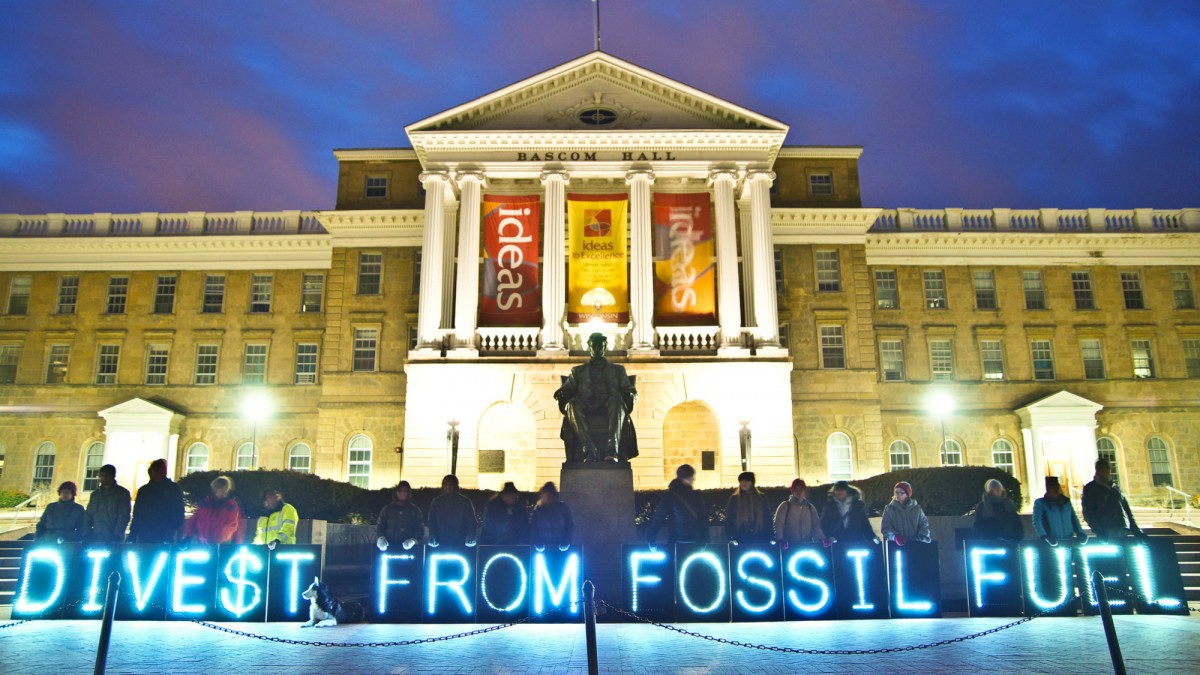This spring, our college administrators face a choice. They will have to pick a side.
It is a choice that has been a long time coming. Ever since the fossil fuel divestment movement ignited across campuses internationally two years ago, our university leaders have been bending over backwards to accommodate the contorted logic of an extractive economy.
Whether they are trustees who ask Harvard students to "thank BP," or presidents who believe that turning off light bulbs can help solve climate change, administrators have revealed themselves to be out of touch with reality. Presumably in the fantasy world of college boardrooms, the fossil fuel industry neither poisons hometowns nor receives $88 billion in corporate welfare a year.
Yet back on planet Earth, students know that university endowments gamble away our futures with investments that undermine everything higher education stands for. At this crucial juncture in history, to value critical thinking and academic credibility is to value climate justice.
That is why this spring, we will ask our administrators, "Whose side are you on?"
The choice is stark enough to break through the cognitive dissonance preventing our leaders from acting. By fighting for divestment, students have proven that we will no longer be held hostage by an industry that insists on digging us deeper into its oil wells under the pretense of necessity. There is nothing necessary about tar sands. There is nothing necessary about investments which threaten the future generations that endowments are invested for.
We must ask of our administrators "whose side are you on" because they have yet to side with us, their students. The fossil fuel industry, by contrast, has already made clear where it stands: with the 1% of Wall Street profiteers and oil barons, with outdated infrastructure and fossilized ideas, with extraction and exploitation. Our administrators’ choice, then, is simple.
It is the choice between the future we must achieve and the future we must avoid. Fossil fuel investments, whose value is predicated on climate catastrophe, are more than tacit endorsements of a rogue industry. They are the funds which front the cost of extreme energy’s expansion. They are a bet on a business model that is not only morally bankrupt, but also existentially unsound. Divestment places us on the right side of history, and of physics.
We ask that our colleges pick a side because they have run out of excuses. The tide of divestment victories from 2014 continues to rise in the new months of 2015, demonstrating the possibility—and potential—of shedding tainted and inflated stocks. With Cambridge Associates, the largest endowment consultant in the world, facilitating pathways to divestment for campuses, the movement’s momentum is undeniable. Our administrators need only make the right choice.
We will make sure that they do. Investments that support an unconscionable status quo are themselves unconscionable. As students build a more imaginative future, we ask that our leaders join us. Until then, we will disregard business-as-usual just as business-as-usual has disregarded us. This marks the beginning of the next phase of the fossil fuel divestment movement. We vow to march forward and will refuse to back down.
This statement was co-written by Miles Goodrich and other members of the "The Escalation Strategy Working Group," a subcommittee of the national Divestment Student Network, and signed by representatives from groups at the following colleges and universities:
Bowdoin Climate Action, Bowdoin College, Maine Divest Harvard, Harvard University, Massachusetts Divest Tulane, Tulane University, Louisiana Fossil Free CU, University of Colorado-Boulder, Colorado Fossil Free Reed, Reed College, Oregon Fossil Free UC, University of California, Berkeley Swarthmore Mountain Justice, Swarthmore College, Pennsylvania UMass Fossil Free Campaign, University of Massachusetts-Amherst, Massachusetts
3 WAYS TO SHOW YOUR SUPPORT
- Log in to post comments














